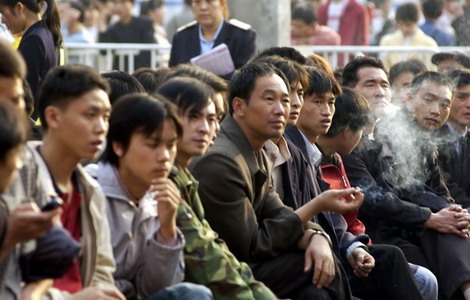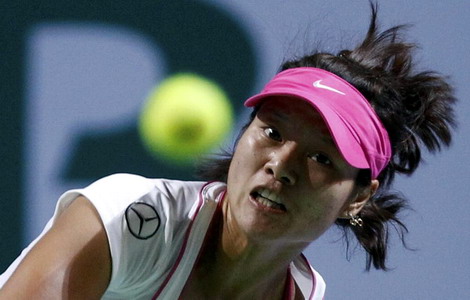Program helps students learn and grow together
Updated: 2011-10-31 06:50
By Zhang Yunbi (China Daily)
|
|||||||||||
 |
|
An Austrian college student teaches children English at the Shaolin Culture and Martial Arts School in Xincai, Henan province. ZHAO XUEFENG / FOR CHINA DAILY |
Renz, a postgraduate student at University of Salzburg in Austria, was paired with the Chinese exchange student two months ago in a "buddy system". They have got on famously ever since.
"She talks as much as I do," Renz said of her new pal with a laugh.
Both are participants of the media communication and management program jointly run by Austrian and Chinese education administrations as part of the Erasmus Project, a European Union student exchange program.
Gao, a 22-year-old postgrad at Beijing Foreign Studies University, arrived in Salzburg, the hometown of Mozart, in September with 18 other Chinese students selected to attend the five-month, tuition-free program.
As well as the buddy system to help newcomers settle in, group discussions and content analysis done in class enable students to have a more comprehensive view of the world.
Renz, who majored in communication science, law and economics, said she was surprised at how open-minded the Chinese students are and how interested they are in international news.
Gao said she has noticed many people in Salzburg and Vienna, the Austrian capital, can speak English, and on more than one occasion has been greeted in Mandarin.
This multicultural flavor is thanks to student exchanges, tourism and trade links, experts say.
Chen Hangzhu, an education official with the Chinese embassy in Austria, said that about 2,500 Chinese youngsters are studying in Austria, while a growing number of postgrads are pursuing master's degrees or PhDs in the country.
"Austria enjoys a comparative advantage in attracting people from abroad to study law, and biochemical and ecological technologies," Chen said.
Asian countries such as China, Japan and Malaysia have become popular holiday resorts for the European middle class, and the evolving trade ties between China and Austria are said to be gathering momentum.
"A couple of my Austrian friends have direct or indirect business connections with China, and some of their relatives have been to Beijing on business trips," said Gao.
A recent survey of 3,000 urban residents in six Chinese cities showed people think much more favorably about EU countries than the United States or Japan. About 80 percent admired Europe for its technological and scientific advances, although only 47 percent said they liked European ways of doing business, according to the study conducted by scholars at the Chinese Academy of Social Sciences, Renmin University of China and their partners in Britain, Germany and the Netherlands.
As for the different views between Chinese and Austrian youths toward career paths, Gao said Chinese students generally care more about their goals before graduation.
Self-fulfillment is more important for Austrian students, said Renz, adding that many try different things, such as internships and combining diverse studies, to find their ideal profession.
As part of the Erasmus media program, Austrian students, including Renz, will visit China between February and July next year, first traveling to Shanghai and then Beijing.
"We will be their buddies then and will be showing them around," Gao added.
Ouyang Yuanhua contributed to this story.
China Daily
Hot Topics
Libya conflict, Gaddafi, Oil spill, Palace Museum scandal, Inflation, Japan's new PM, Trapped miners, Mooncake tax, Weekly photos, Hurricane Irene
Editor's Picks

|

|

|

|

|

|







